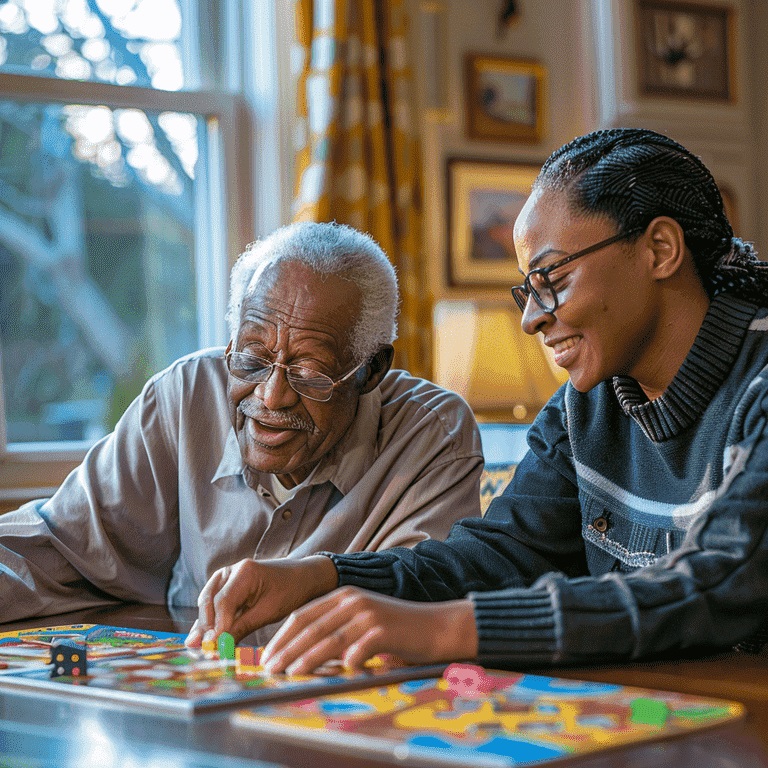Introduction
Games are not just for the young. They are also very helpful for seniors. Games offer cognitive boosts and chances for socializing. With the right games, elderly people can enjoy better mental health. They also get more friends and even some physical benefits. This guide will explore many games. They are not just fun but also suited to seniors’ needs and abilities.

Discover the Joy of Games: Seniors Engaging in a Lively Card Game
Types of Games for Seniors
Board Games
Strategy Games
Strategy games stimulate cognitive processes such as problem-solving and strategic planning.
- Examples of popular strategy games:
- Chess
- Checkers
- Risk
- Benefits of playing strategy games:
- Enhance cognitive flexibility
- Improve decision-making skills
- Increase patience and focus
Word Games
Word games help seniors practice vocabulary, spelling, and, often, their memory skills.
- Examples of engaging word games:
- Scrabble
- Boggle
- Crossword puzzles
- Cognitive benefits of word games:
- Expand vocabulary
- Strengthen language skills
- Enhance memory retention
Card Games
Classic Card Games
These games are fun and a great way to engage socially with others.
- Popular classic card games:
- Bridge
- Rummy
- Poker
- Social benefits of card games:
- Foster social interactions
- Enhance emotional well-being
- Provide a sense of community and belonging
Trick-Taking Card Games
Trick-taking games involve strategy and memory. They are ideal for exercise.
- How to play and examples:
- Spades: Partnerships aim to win the number of tricks they bid on initially.
- Euchre: A quick-moving game that involves taking tricks and using a trump suit.
- Mental agility and trick-taking card games:
- Improve short-term memory
- Enhance strategic thinking
- Foster competitive spirit
Digital Games
Video Games
Video games can provide great fun and provide physical activity and cognitive stimulation.
- Popular video games suitable for seniors:
- Wii Sports
- Simple puzzle games like Tetris
- Adventure games like The Sims
- Physical and cognitive benefits of video games:
- Improve hand-eye coordination
- Enhance cognitive flexibility
- Encourage problem-solving skills
Mobile Games
Smartphones have made mobile games accessible. They are tools for thinking.
- Top mobile games for cognitive exercises:
- Words With Friends
- Sudoku
- Memory games
- Accessibility features in mobile games:
- Adjustable text size and contrast settings
- Simple, intuitive gameplay
- Availability of tutorials and help functions
Outdoor Games
Outdoor games are not just about fun; they’re a way to keep physically active and enjoy the fresh air.
- List of outdoor games:
- Bocce ball
- Horseshoes
- Shuffleboard
- How these games benefit physical health:
- Improve coordination and balance
- Encourage gentle exercise
- Promote vitamin D intake from sunlight
- Safety tips for playing outdoor games:
- Always wear appropriate footwear.
- Use sun protection, like hats and sunscreen.
- Keep hydrated, especially on hot days.
Indoor Physical Games
When the weather doesn’t cooperate, plenty of indoor games keep seniors moving.
- Games that can be played indoors:
- Indoor bowling
- Walking circuits
- Chair yoga
- Physical benefits of these indoor games:
- Enhance flexibility and muscle strength
- Improve circulation
- Reduce the risk of falls
- Adaptations for limited mobility:
- Use chairs for balance or seated exercises
- Adjust the length and intensity of activities
- Ensure clear and safe space to prevent accidents

Enhancing Mind and Memory: A Senior Engages in Puzzle Solving
Cognitive Development Games
Puzzle Games
Puzzles are crucial for seniors’ thinking skills. They offer many challenges. These can be tailored to each person’s abilities.
- Types of puzzles ideal for seniors:
- Jigsaw puzzles
- Logic puzzles
- Word search puzzles
- Benefits of puzzles for mental health:
- Delay cognitive decline
- Improve memory and problem-solving skills
- Provide a sense of accomplishment
Brain Training Apps
Technology isn’t just for the young; it’s also a fantastic resource for senior brain health.
- Recommended apps for cognitive training:
- Lumosity
- CogniFit
- Peak
- How these apps help maintain cognitive functions:
- Offer tailored brain training programs
- Track progress and adapt to abilities
- Stimulate different areas of the brain

Building Bonds: Seniors Enjoy Social Interaction Through Board Games
Social Interaction Through Games
Group Games for Social Gatherings
Playing games in a group can help seniors keep their social networks. It can also help them make new friends.
- Ideas for group games:
- Charades
- Trivia night
- Bingo
- Importance of social interaction for seniors:
- Alleviate feelings of loneliness and isolation
- Improve mental health
- Enhance emotional resilience
Family-friendly Games
Games that can be enjoyed with family members of all ages are precious for bonding.
- Games that bridge the generation gap:
- Pictionary
- Monopoly
- Card games like Uno
- Ways these games enhance family bonds:
- Encourage communication and teamwork
- Create joyful memories
- Provide enjoyable learning experiences for all ages
Each game type offers unique benefits for seniors. They boost physical health and improve thinking skills. They also foster critical social connections. Doing this will help seniors have a better, more vibrant life. They should add these activities to their daily routines.

Tailoring Fun: Choosing the Right Games for Different Abilities
Choosing the Right Games for Different Abilities
Assessing Cognitive and Physical Capabilities
Picking a game for a senior involves understanding their needs and abilities.
- How to choose games based on ability:
- Observe the senior’s current hobbies and activities for clues about their preferences.
- Consult with healthcare providers for recommendations based on physical and cognitive health.
- Consider the senior’s comfort with technology when selecting digital games.
Adaptable Games for Various Senior Needs
You can change many games to suit different levels of mobility and thinking ability. This ensures everyone can join in.
- Examples of adaptable games:
- Card games with large print or braille for those with vision impairments.
- Board games with modified rules to shorten game length or simplify decisions.
- How these adaptations help inclusion:
- Enable seniors with various abilities to engage meaningfully in play.
- Foster a sense of achievement and independence.
- Promote inclusivity in group settings.
Games are a fantastic tool for seniors, providing many benefits beyond simple entertainment. Games can enhance thinking, keep the body healthy, and build social connections. They are vital for improving seniors’ lives.
- Summary of the benefits of gaming for seniors:
- Cognitive benefits: Games stimulate the mind and can help slow the progression of cognitive decline.
- Physical benefits: Physical games promote exercise and improve strength, balance, and coordination.
- Social benefits: Games create opportunities for social interaction, helping to combat loneliness and depression.
- Final thoughts on integrating games into daily routines:
- Incorporate a variety of games to address different aspects of health and wellness.
- Encourage regular game-playing sessions to build routine and anticipation.
- Involve family and friends to enhance the social benefits of gaming.
By picking the right games and playing them a lot, seniors can enjoy better health and wellness. They can also have a richer, more engaging social life.
What are the best types of games for seniors with limited mobility?
For seniors with mobility issues, consider games that need little movement. These include card and board games like chess or checkers. Also consider video games that can be played sitting down, like certain puzzle or story games.
How can I modify games to suit different cognitive levels?
To fit different abilities, simplify game rules. Or, choose games with flexible rules. For example, use fewer cards in card games. Or, choose puzzles with more and fewer pieces. Additionally, interactive digital games often have settings to adjust difficulty levels.
What should I look for in a game to enhance a senior’s cognitive abilities? Choose games that involve memory, strategy, and problem-solving. Examples include:
- Crossword puzzles for language and memory.
- Strategy board games like chess for complex thinking.
- Digital brain-training apps that specifically target cognitive skills.
Can games improve a senior’s social life?
Absolutely! Many games encourage social interaction. This can be vital for seniors, who often face social isolation. Games like bingo and group card games can help seniors connect with others. So can social network-connected digital games.
Are there any accessible digital games recommended for seniors?
Yes, game designers create many digital games with seniors in mind. Look for games with adjustable settings. These settings include text size and contrast. Also, look for games with simple controls and clear instructions. Popular choices include word games and solitaire. They are puzzle-type games on tablets and smartphones.
What physical games are safe for seniors to play indoors?
Safe indoor games for seniors include walking circuits, chair yoga, and gentle stretches. You can modify them for physical limits. Games like indoor bowling or bean bag toss promote light physical activity. They are safe and fun.
Adaptable Games: These are games that can be modified to meet the needs of players with various abilities and limitations. These adaptations may include game rules, playing equipment, or gameplay environment changes.
Board Games involve a board as a primary component, where players move pieces or tokens according to rules. Examples include chess and Monopoly.
Brain Training Apps are digital applications designed to improve cognitive functions by engaging in specially designed games and puzzles. These apps enhance memory, problem-solving skills, and other cognitive abilities.
Card Games: A type of game that uses playing cards as the primary device with which the game is played, be it traditional or game-specific. Popular examples include poker and bridge.
Cognitive Abilities: Mental skills are needed to carry out any task, from the simplest to the most complex. These abilities include memory, thinking, reasoning, and problem-solving.
Digital Games: Video or computer games played through devices such as computers, gaming consoles, or mobile phones. These games can range from simple puzzle games to complex virtual worlds.
Group Games are games designed to be played by multiple people, promoting social Interaction and teamwork. Examples include trivia games and charades.
Indoor Games: Games designed to be played inside that do not require large areas or particular fields. They are suitable for less intensive and more controlled physical activities.
Mobility Issues: Physical limitations that reduce a person’s ability to move freely can affect game participation and require modifications to traditional game setups.
Physical Games: These are games that require bodily movement and are often used as a form of exercise. They can be tailored to indoor or outdoor settings and can vary in intensity.
Puzzle Games: Games that challenge a player’s problem-solving skills, including logic, pattern recognition, sequence solving, and word completion. Examples include Sudoku and jigsaw puzzles.
Social Interaction is the process by which individuals act and react in relation to others. In the context of games, it refers to the Interaction among players during gameplay.
Strategy Games are games in which the players’ decision-making skills are highly significant in determining the outcome. These games often require planning and tactics to win. Examples include chess and Risk.
Video games involve human Interaction with a user interface to generate visual feedback on a video device such as a TV screen or computer monitor.
Are you a New York State resident passionate about caring for your elderly loved one? Get paid for your dedication and hard work as a caregiver. Call us at 718-908-2273 (or 718-908-CARE) today for more information on how you can transform your care into a rewarding career with Pella Care CDPAS. Don’t miss this opportunity to make a difference in your loved ones and yours. Call now and take the first step towards a supportive and fulfilling journey.

Recent Comments